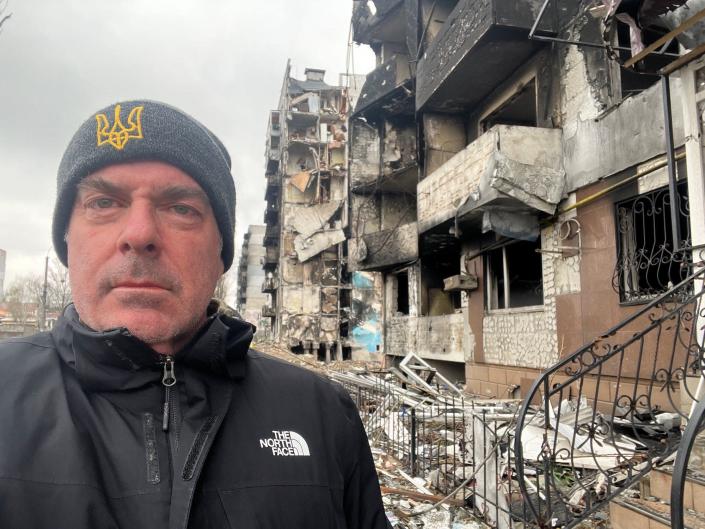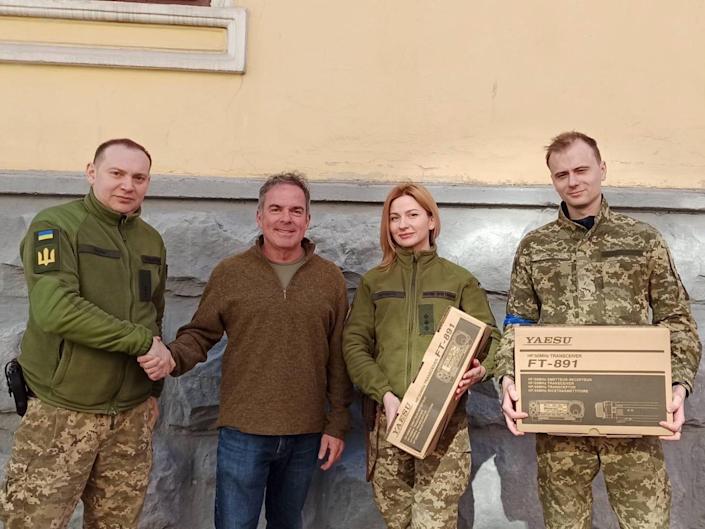
-
Former Hill staffer Steven Moore has been helping out in Ukraine for two months.
-
He said he’s supplied clinics, evacuated civilians, and outfitted soldiers in nearly a dozen cities.
-
“There’s an unlimited amount of need here,” Moore said of the ongoing rescue mission.
Three days after Russia invaded Ukraine in February, 53-year-old political adventurer Steven Moore lugged two suitcases packed with thousands of dollars worth of survival gear to the Tulsa, Oklahoma airport and hopped on a flight to the raging warzone.
After spending 48 hours fielding non-stop phone calls and text messages from Ukrainian friends blindsided by Russian President Vladimir Putin’s latest attempted power grab, Moore said launching a self-styled rescue mission just made the most sense. He figured he could be most useful sharing the problem-solving skills he’d honed while working in conflict zones including Iraq, East Timor, and the Democratic Republic of the Congo.
“Everyone was in denial. Nobody thought that Putin was going to invade,” the one-time chief of staff to former Republican Rep. Peter Roskam of Illinois said of the shock that rippled through his Telegram and WhatsApp chat threads.
“I just thought, ‘My friends are in trouble. They need my help. I can do a better job If I’m inside Ukraine’,” Moore said of the decision to rush overseas. Two months into his latest mission, Moore estimates that his Ukraine Freedom Project has shepherded more than 110 people to safety.
The all-volunteer group, which had raised nearly $200,000 from online donors by May 4, has also reunited families, delivered medicine to overwhelmed hospitals, outfitted Ukrainian soldiers, and helped evacuate one appreciative mom days before artillery fire rained down on her street. Insider verified his accounts by interviewing Ukrainians who had received Moore’s help, and by reviewing videos, photos, and documentary-style footage of the Ukraine Freedom Project’s work.
“The Russians are trying to kill everybody in this country,” Moore told Insider, adding, “There’s an unlimited amount of need here.”
Running toward danger
A lack of military training has, at least so far, never hampered Moore’s ability to go where the action is.
The lifelong GOP operative has sought out political hotspots throughout his career, dating back to the consulting work he did in 1996 for then-Russian presidential hopeful Boris Yeltsin’s campaign.
“I’ve done polling in about 12 countries,” Moore said of the skill set that’s led him from the Aceh region of Indonesia in 2003, to Iraq in 2005, and most recently to Ukraine in 2018.
That earlier visit, Moore said, plugged him into various aspects of Ukrainian life, including local media — he did polling work for a news organization — the business community, and the military. He said he befriended Donbas veterans who’ve been battling Russian-aligned separatists since 2014.
As a Capitol Hill veteran, Moore said he is “not the typical aid worker.” He can call friends in DC, tell them what he’s seeing, and translate Ukrainians’ pleas into next steps for official Washington.
“I know these people. I hear what they’re saying,” Moore said. “And I try to amplify that to members of Congress and congressional staff with whom I have relationships.”
Warzone prep — at a hunting store
Moore said he stocked up as best he could before heading to Ukraine.
That meant sweeping through a hunting store in Broken Arrow, Oklahoma for “everything I could figure out that might be somewhat useful to anyone in a war,” Moore said. That initial haul included satellite mapping gadgets, walkie-talkies, knives, flashlights, and binoculars.
“Bass Pro Shop was not designed to outfit soldiers, but I took everything they might have,” Moore said of the $5,2000 shopping spree.
He also filled an additional suitcase with “everything you can get over the counter” from a pharmacy during a 10-hour layover in Frankfurt, Germany.
“I got on the phone with a doctor friend in Ukraine and she said ‘we need this medicine.’ So I went to a drugstore and bought as much stuff as I could cram into a suitcase, like bandages and iodine,” he said, racking up another $3,000 charge mid-voyage.
While he said he initially planned to set up shop in Romania, as Russia escalated its attacks Moore quickly realized he was needed in Ukraine. So he said he rented an apartment that became Ukraine Freedom Project’s first safehouse and got to work figuring out an agenda.


Two days later, he got his first unsolicited call: pull two terrified college students out of Ternopil ASAP. So he made the four-hour drive to save 20-somethings Kseniia Zanko and Anastasiia Poshtarenko.
“They were scared and quiet at first, so I made it into a road trip. We were singing Eagles’ songs about 90 minutes into it,” Moore said of his first extraction run, adding that the two women have since migrated to Milan, Italy. Insider has not independently verified the account of rescuing the students.
Now, Moore describes his work as “incident driven.” He finds drivers or members of the local territorial defense group made of Ukrainian military reservists, who aren’t engaged on the front that day, to help out.
Messaging services like Signal, WhatsApp, and Facebook keep the constant check-ins flowing while clicking through Uber and Airbnb have made it easier to move around Ukraine and recharge in Romania, respectively, Moore said.
“I frequently get messages like, ‘Hey, we’ve got people stuck in such and such place. Can you help us?'” he said.
‘Doctors didn’t have the meds’
Moore said his group is currently staffed by five people but that number swells when the group needs additional support.
“People step up. So, how big is the Ukrainian Freedom Project? It’s five and it’s 500,” Moore said of the fluctuating number of volunteers. “And that’s an exciting thing to be a part of.” That exuberance, however, is often tempered by the horrors he has witnessed.


Watching doctors in Bobrytsa and Bilohorodka struggle to care for bloodied countrymen was gut-wrenching.
“I was there for about a half an hour, and I saw probably a dozen people come through with just horrific wounds,” Moore said of the civilian casualties he saw pouring in from battles in Irpin and Bucha. “The place was just overwhelmed. These doctors didn’t have the meds. They didn’t have the space. They didn’t have the equipment. But they were trying to save these people’s lives.”
Just in time
Iryna Dreval, a Ukrainian interpreter and translator, told Insider she met Moore during his previous stint in Ukraine, serving as his interpreter for about a year. She was reluctant to leave her new home in Kyiv when the war started after fleeing Donetsk in 2014 because of earlier Russian aggression. Moore checked on her every day in recent months, Dreval said.
“I was sure that nothing like this could ever happen in Kyiv. But I was wrong,” Dreval wrote in an email to Insider.


Moore had been begging her to take her 8- and 12-year-old sons somewhere safer, Dreval said, offering to set them up in a safehouse in the interim.
“It was the best decision I have ever made,” Dreval said, adding that shortly thereafter her former neighborhood got shelled. “The windows of my apartment were damaged. Cars near the building were destroyed.”
Dreval said she has since moved to England with her sons to spare them from trouble sleeping at night “because of air raid sirens.”
Hospitality worker Varvara Lushchik has dug her heels deeper into Ukraine with Moore’s help. She said once the war became a reality, the Kyiv restaurant she worked in transformed into an emergency shelter and community pantry.
“We decided to cook more for our army, hospitals, and the old people in our district,” Luschchik told Insider in an email. “But we didn’t have enough resources.”
Within days of texting with him, Luschchik said, Moore dropped off two brand new ovens.
“Now we can cook more than 1,000 portions per day. So, Moore’s work made our life easier, more useful, and better,” she said.
Bridging Ukraine and DC
Moore met with several House Republicans who traveled to the area in early April to assess the situation in Ukraine for themselves. During their trip, Moore tweeted out selfies with House Republican Whip Steve Scalise of Louisiana, House Appropriations Committee member Ken Calvert of California, and Rep. French Hill of Arkansas.
“I was pleased that Americans, like Steve, are offering their expertise and personal commitment in aiding the Ukrainian people with badly needed humanitarian assistance,” Hill told Insider.
Meanwhile, Moore gave Republican Rep. Adam Kinzinger of Illinois a Twitter shout-out for donating $25,000 to the cause. Moore said he’d helped fundraise and campaign for Kinzinger over the years, and felt like the six-term lawmaker “kindly returned the favor.” Kinzinger’s office declined to comment about the contribution.
Staying on target
Moore said helping Ukrainians rein in Russian invaders is his mission for the foreseeable future.
“I want to help stop them in Ukraine before they make it into Poland or Romania. Or they start getting really aggressive and doing things to people I love,” Moore said. “I mean, if this is World War Three, let’s stop it now.”
If Ukrainians are trained and equipped properly, Moore said he thinks “this is a very winnable situation.” He praised the White House and Congress for working together to send Ukraine the money, munitions, and morale boost it so desperately needs right now.
“There’s certainly a lot of money being appropriated,” he said of the billions in aid that’s already been authorized. But Ukrainians also appreciated, Moore said, knowing “they’ve got America behind them.”
He’s fine, however, with ceding defense strategy to others.
“I don’t have time, necessarily, to ask the bigger questions,” Moore said. “All I know is that my friend in Kharkiv needs food.”
Read the original article on Business Insider




